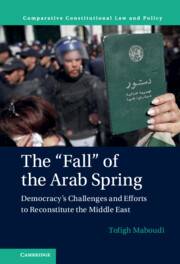
- Cited by 3
-
Cited byCrossref Citations
This Book has been cited by the following publications. This list is generated based on data provided by Crossref.
Martin, Alexander P. and Carey, John M. 2023. Great for Constitution Writing but an Obstacle to Democratic Consolidation: The Ephemeral Value of the Hare Quota Formula in Tunisia’s Parliamentary Elections. Representation, Vol. 59, Issue. 4, p. 683.
Vloeberghs, Ward and Bergh, Sylvia I. 2024. Social Accountability Initiatives in Morocco, Tunisia, and Lebanon. p. 1.
Maboudi, Tofigh and D'Amico, Elisa 2025. Vulnerability, climate laws, and adaptation in the Middle East and North Africa. Environmental Policy and Governance, Vol. 35, Issue. 1, p. 145.
- Publisher:
- Cambridge University Press
- Online publication date:
- March 2022
- Print publication year:
- 2022
- Online ISBN:
- 9781009023382


